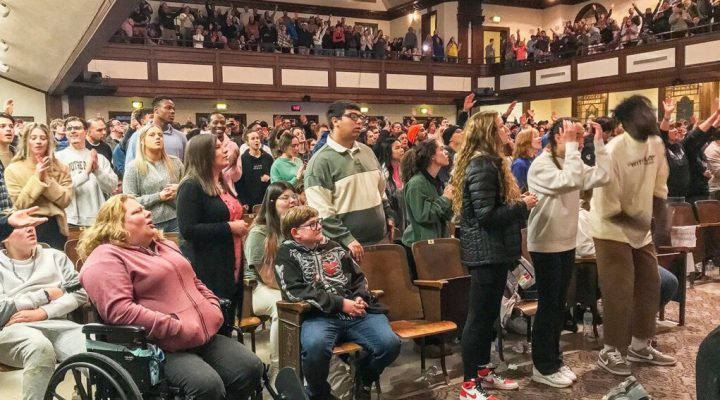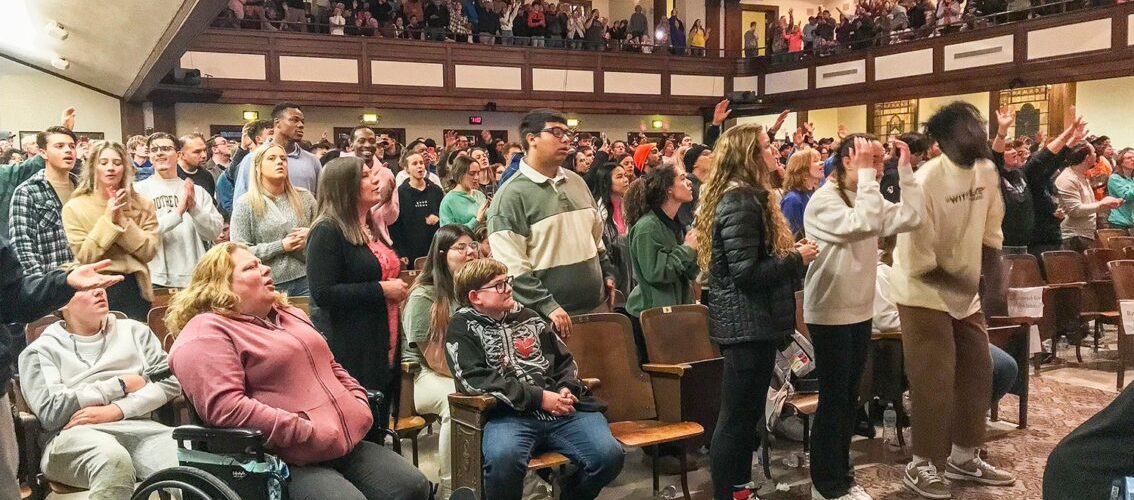During Super Bowl LVII, nestled among ads for chips and beer came a profound message: Jesus Gets Us.
The Servant Foundation, a Kansas organization backed in part by Hobby Lobby, has produced a campaign designed to humanize the Lord. The ads feature slick photographs of the human condition — families laughing, people begging, refugees on the road, children hugging on the sidewalk, a lonely man on a subway train — with stirring music playing underneath.
The ads then connect the images to Christ. “Jesus was a refugee,” one reads. Another notes that “Jesus felt alone, too.” And another, “Jesus loved the people we hate.”
Each ad ends with the tagline, “He gets us.”

Jim Trammel
A lot of professional skill is put into these ads. The photos are well-crafted and compelling. The music is rousing. And with a reported $20 million spent on Super Bowl airtime alone, there is enough money behind the campaign to ensure its success.
“Many have relegated Jesus from the world’s greatest love story to just another tactic used to intensify our deep cultural divisions,” says the campaign’s website. The solution is to “move beyond the mess of our current cultural moment to a place where all of us are invited to rediscover the love story of Jesus.”
This may be the most well-produced and well-funded Christian media blitz ever created. It also could be the most unnecessary. The ads tell us “Jesus loves those we hate,” but most people already know that. We also know “Jesus felt alone,” and “Jesus was a refugee.” Plus, practically everyone believes Jesus “gets us.”
The political right loves Jesus; so does the political left. Jesus is loved by virulent homophobes and out-and-proud gays and lesbians alike. Rebels, refugees, loners, children and even atheists who reject the divinity of Christ still celebrate his love and care for all. If there is anything our deeply divided culture can agree on, it’s that we all like Jesus.
If The Servant Foundation wants people to “rediscover the love story of Jesus,” perhaps it could take its cues less from the admen of Madison Avenue and more from college students in Kentucky.
A couple of days before the “He Gets Us” ads aired on the Super Bowl, a chapel speaker at Asbury University took the stage at Hughes Auditorium and contrasted Jesus’ love against the manipulative, abusive actions of the church. “Some of you guys have experienced that love in the church,” he said. “It feels like someone has pulled a fast one on you.’”
The speaker warned students that celebrity poisons the church and he did not want to be accused of being narcissistic or manipulative himself. “I hope you guys forget me but anything from the Holy Spirit and God’s Word would find fertile ground in your hearts and produce fruit. Romans 12. That’s the star, OK? God’s word and Jesus and the Holy Spirit moving in our midst, that’s what we’re hoping for.”
What came next was covered widely in Christian media. The chapel service, which was supposed to last an hour, continued for weeks. Students stayed in the auditorium sharing their testimonies and singing. People from the community heard what was happening and came on campus to experience this outpouring of the Spirit. Soon travelers from all over the nation made pilgrimages to Asbury. (Full disclosure: I am an Asbury graduate.)
Asbury could have turned the service into a media-friendly spectacle. The event was raising the school’s profile as the press ran stories about the unusual happenings at a tiny college. Asbury “trended” on Christian Twitter as people debated whether or not the event was a “real revival.” Tik Tok was filled with videos shot in the auditorium, which both documented the event and publicized the college. For Asbury, this never-ending chapel service generated millions of dollars’ worth of free advertising.
But Asbury didn’t capitalize on the marketing potential like it could have. The administrators ensured no one used the revival to further their agenda. They avoided taking any credit for the service and did not name any students involved out of concern for creating “stars” of the revival. They vetted the persons who wanted to give testimonies to ensure the event was not tainted by disrupters or used as a platform for their own agendas.
“They ended the service before it could become a campaign.”
And most notably, when the word spread too far and the event became a logistical nuisance, Asbury pulled the plug. They ended the service before it could become a campaign.
I believe Jesus wouldn’t have been comfortable with marketing campaigns. He told people he healed not to tell anyone, yet the crowds found out anyway. He didn’t seem to seek the limelight. Instead, the Bible tells us he frequently went off by himself, and he chastised the high priests who prayed in public for the publicity.
Jesus didn’t try to be loved by others or thought of as “cool,” and he didn’t run an imaging campaign to convince people that he “got” them.
But 2,000 years later he’s still perhaps the most widely known and well-regarded person in history. And he did it without buying a Super Bowl ad.
Jim Y. Trammell is associate professor of communication at High Point University in High Point, N.C. His scholarship centers on religion, media and popular culture. He and his family are members of Emerywood Baptist Church in High Point.
Related articles:
He Gets Us, Part 1: The men and money behind the movement | Analysis by Kristen Thomason
Asbury University closes down revival that clogged small Kentucky town
‘Something wonderful and of God is happening at Asbury,’ church historian believes | Analysis by Joseph Early


